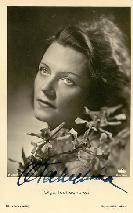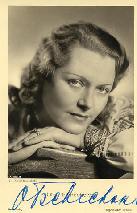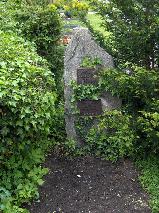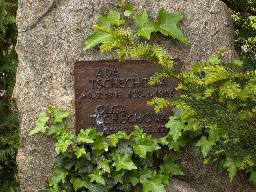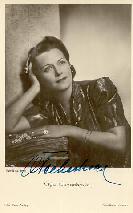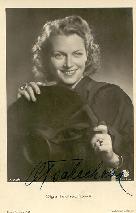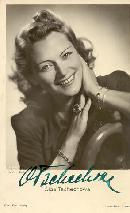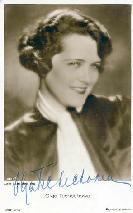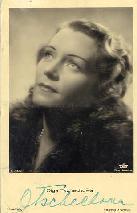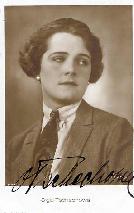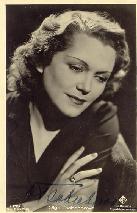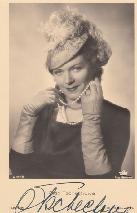Tschechowa, Olga |
| ACTOR (RUSSIA) |
|
BORN 26 Apr 1897, Alexandropol (now: Gümri, Armenia) - DIED 9 Mar 1980, München, Bayern BIRTH NAME Knipper, Olga Konstantinova von GRAVE LOCATION Gräfelfing, Bayern: Gemeindefriedhof, Grosshaderner Strasse 2 |
|
Olga Tschechova was born as Olga von Knipper. Her father was an engineer who became minister of railways under Nicolas II. Her aunt Olga von Knipper was an actress who married the writer Anton Tchechow. In 1914 she married Michail Tschechow, a nephew of Anton Tschechow. The marriage fell apart after only three years, but they had a daughter, Ada. Olga studied sculpture with Golubkina and drama with Konstantin Stanislavskij. She had small parts in Russian movies in 1917 and 1918. In 1920 she went to Berlin to purchase theatre materials for her aunt, but she didn't return to Moscow. In 1921 she had a small part in "Schloss Vogelöd", directed by F.W. Murnau. She played in more silent movies, but wasn't very successful until she had her break in "Die Stadt der Versuchung" (1925). In 1930 she became a German citizen and she continued her career in sound movies. She played in many films in the thirties and also during the war. In 1933 she was introduced to Adolf Hitler and she became a personal friend of the Führer. Olga protected her daughter Ada by hiding the fact that her former husband was Jewisd and she problably assisted her brother Lev Knipper in surviving a concentration camp (he had been sent to Germany to assasinate Hitler without telling Olga about the plan). In 1936 she married the Beligian businessman Marcel Robyns, but in 1938 the marriage was over and she returned to Berlin. Her contacts with some of the nazi leaders detoriated during the war. In July, 1941, shortly after the invasion of Russia, Goebbels had invited her for an official party and he asked her if they would have a Christmas in Moscow that year. She coldly replied 'no' and a surprised Goebbels asked why. She referred to Napoleon and stated that the Russians would consolidate against invaders. Goebbels asked her if she was predicting a Russian victory, but she said she predicted nothing and only answered his question if the German soldiers would be in Moscow by Christmas and that she could be either right or wrong. Goebbels seems to have hated her afterwards. Himmler wanted to arrest her in January, 1945. When she heard about this she called him directly and asked him if she could finish her cop of morning coffee. An angry Himmler came to her home with SS officers to get her but when he opened her door he looked in the face of Adolf Hitler. Hitler told him that he had made a mistake. In 1945 she was brought to Moscow by the Red Army, but she was returned to Berlin a few months later. After the war there was talk that she had worked for the KGB and was even decorated for it. But it was an aunt of hers that was decorated. Her movie parts became smaller after the war and she ended her career in the late fifties, returning for a short time during the early seventies. In 1955 she launched a successfull cosmetics company. Her daughter Ada was also an actress and died during a plain crash in 1966. A few moments before she died she asked her granddaughter Vera for a glass of champagne. Her last words were 'Life is beautiful'. |
Sources • filmportal.de - Alles zum deutschen Film • Porträt der Schauspielerin Olga Tschechowa by Thomas Staedeli |
